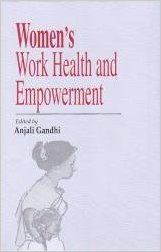This book is an outcome of a seminar on the National Policy for Empowerment of Women, organized by the Sarojini Naidu Centre for Women Studies and the Department of Social Work, Jamia Millia Islamia, Delhi. It comprises twelve essays which are organized around four broad themes of women’s empowerment, women’s work, religion and health. In her brief introduction to the book, Anjali Gandhi summarizes the issues and ideas taken up in the chapters. However, she fails to provide a conceptual or policy framework linking work, health and empowerment and to place the accompanying articles in the context of larger debates. The title of the book is hence misleading and it is disconcerting to note that the overall approach is non-feminist. Referring to the wide range of issues confronted by women, the editor accepts that the book is far from comprehensive.
The book begins with K.K. Singh’s descriptive paper which traces efforts at women’s empowerment in relation to the National Policy for Empowerment of Women. He concludes that despite India ratifying international treaties and formulating and implementing policies in lines with international efforts, gender disparity remains and social stereotyping and violence at domestic and societal levels continue.
Kamla Sankaran’s succinct account of issues related to women’s work participation with a focus on poor women in the unorganized sector, their wages and issues of opportunities and social security, draws critical attention to ‘the fine line ensuring safe working condition for all workers, including women in the informal sector and providing equal opportunity for all workers seeking employment’. This is easily the most scholarly essay on developmental issues in the book.

